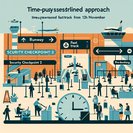
Speaking at the Süddeutsche Zeitung Economic Summit in Berlin on 17 November 2025, Chancellor Friedrich Merz said Germany had become “too sluggish and too bureaucratic” and announced plans for a fully digital platform on which international skilled workers could “register once and manage the entire immigration process”.
While details are pending, officials in the interior and labour ministries confirm that the portal will integrate federal visa issuance, recognition of credentials and local foreign-office residence permits into a single workflow, using data already captured by the Foreign Office’s Consular Services Portal. Employers would be able to upload contracts and track case status in real time—features long requested by multinational HR teams.
![Chancellor Merz pledges one-stop digital portal for foreign skilled-worker applications]()
Merz framed the project as part of a competitiveness agenda, warning that Germany risks losing the global talent race if paper-based procedures and fragmented local IT systems persist. He linked digital immigration to broader moves to reduce red tape in company formation, energy permits and R&D tax credits.
For corporate mobility leaders the announcement is significant: once operational, the portal could shrink end-to-end processing from several months to a matter of weeks, cut courier costs, and provide audit trails for compliance. However, data-protection experts caution that harmonising state-level immigration offices will require robust identity-management and cybersecurity safeguards.
The chancellor did not give a launch date but insiders suggest a phased rollout from late 2026, beginning with shortage-occupation visas and Blue Cards. Employers should engage early in stakeholder consultations to ensure the system reflects real-world assignment workflows.
While details are pending, officials in the interior and labour ministries confirm that the portal will integrate federal visa issuance, recognition of credentials and local foreign-office residence permits into a single workflow, using data already captured by the Foreign Office’s Consular Services Portal. Employers would be able to upload contracts and track case status in real time—features long requested by multinational HR teams.

Merz framed the project as part of a competitiveness agenda, warning that Germany risks losing the global talent race if paper-based procedures and fragmented local IT systems persist. He linked digital immigration to broader moves to reduce red tape in company formation, energy permits and R&D tax credits.
For corporate mobility leaders the announcement is significant: once operational, the portal could shrink end-to-end processing from several months to a matter of weeks, cut courier costs, and provide audit trails for compliance. However, data-protection experts caution that harmonising state-level immigration offices will require robust identity-management and cybersecurity safeguards.
The chancellor did not give a launch date but insiders suggest a phased rollout from late 2026, beginning with shortage-occupation visas and Blue Cards. Employers should engage early in stakeholder consultations to ensure the system reflects real-world assignment workflows.










